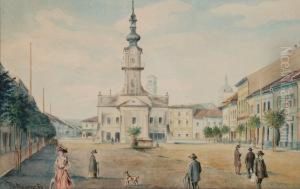Zsolnay Laszlo Mattyasovsky Paintings
László Zsolnay, born on June 14, 1853, in Pécs, Hungary, was an influential figure in Hungarian and European ceramics, particularly noted for his role in the Zsolnay Porcelain Manufacture. The Zsolnay factory was founded by his father, Miklós Zsolnay, in 1853, the year of László's birth, and it became famous for its porcelain and stoneware pieces, characterized by innovative technology and artistic excellence.
László, along with his brother Tádé, played a significant part in the development and modernization of the Zsolnay factory. After their father's death in 1880, László took over the management of the company. Under his leadership, the Zsolnay factory gained international recognition, particularly after winning a gold medal at the 1878 Paris World's Fair for their porcelain. This success marked the beginning of the Zsolnay ceramics' golden age.
The Zsolnay factory, under László's guidance, was particularly renowned for the invention of the eosin glazing process, which gave the ceramics a unique iridescent sheen. The name 'eosin' is derived from the Greek word for dawn, in reference to the reddish glimmer of the glaze. This innovative technique, developed in 1893, was one of the many contributions the Zsolnay factory made to the Art Nouveau movement, which was sweeping through Europe at the time.
László Zsolnay was not just a businessman but also a patron of the arts. He collaborated with numerous artists and architects, contributing to the art nouveau and Secessionist movements within Hungary and beyond. Zsolnay ceramics became part of the architectural decoration in numerous buildings during the period, including the Matthias Church in Budapest and the Hungarian Parliament building.
Zsolnay's dedication to his work and his innovative spirit left an indelible mark on Hungarian art and industry. The Zsolnay name continues to be synonymous with quality and artistry in ceramics. László Zsolnay's contributions to the field were not only technological but also aesthetic, as he was instrumental in ensuring that the artistic quality of the factory's output was of the highest caliber. László Zsolnay passed away on November 23, 1921, in Pécs, leaving behind a rich legacy that continues to influence ceramic artists and manufacturers to this day.


